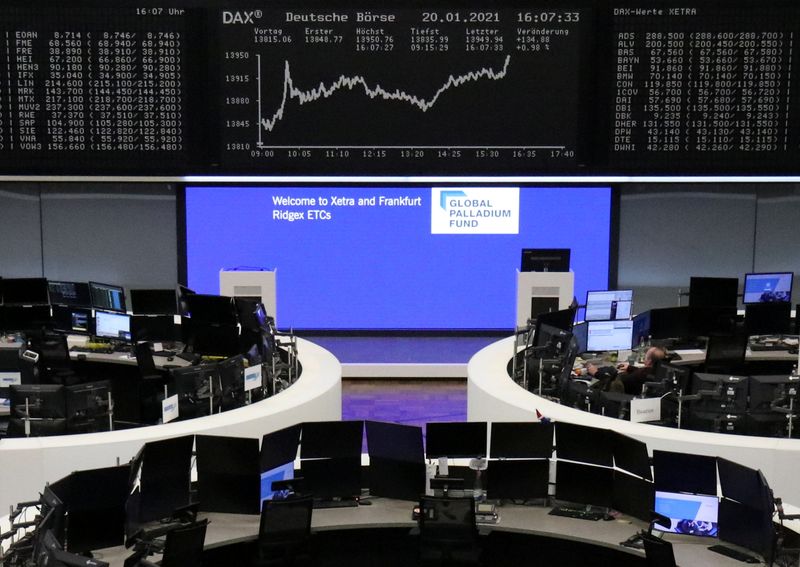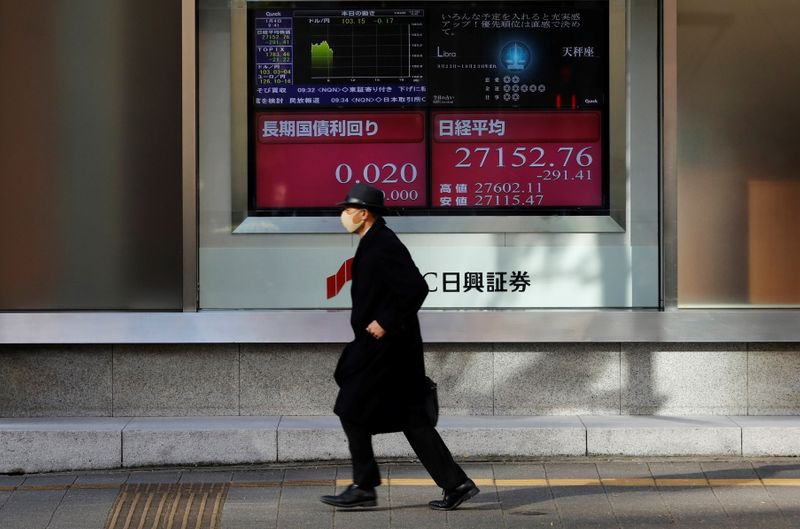By Ritvik Carvalho
LONDON (Reuters) - Global shares rose to levels just shy of record highs on Monday, as optimism over a $1.9 trillion U.S. stimulus plan outweighed rising COVID-19 cases and delays in vaccine supplies.
European stock markets opened higher, with the pan-European STOXX 600 up 0.3%. The continent's 50 biggest stocks were also up 0.3%. (EU)
Germany's DAX rose 0.2%, Italy's FTSE MIB index jumped 0.6% and Britain's FTSE 100 rose 0.1%. Spain's IBEX and France's CAC 40 faltered, down 0.1% each.
A rally in U.S. tech stocks to near record highs on Friday helped fuel gains in their counterparts in Asia and Europe. A European basket of tech stocks gained 1.2%. In Asia, Chinese tech giant Tencent soared 11%.
MSCI's All Country World index, which tracks stocks across 49 countries, was up 0.3% on the day.
Global equity markets have scaled record highs in recent days on bets COVID-19 vaccines will start to reduce infection rates worldwide and on a stronger U.S. economic recovery under President Joe Biden.
Investors are also wary about towering valuations amid questions over the efficiency of the vaccines in curbing the pandemic and as U.S. lawmakers continue to debate a coronavirus aid package.
All eyes are on Washington D.C. as U.S. lawmakers agreed that getting the COVID-19 vaccine to Americans should be a priority even as they lock horns over the size of the U.S. pandemic relief package.
Financial markets have been eyeing a massive package, though disagreements have meant months of indecision in a country suffering more than 175,000 COVID-19 cases a day with millions out of work.
Global COVID-19 cases are inching towards 100 million with more than 2 million dead.
Despite the recent outperformance in tech stocks, investors have reiterated views that cyclical and value stocks will outperform as economies recover.
"While renewed lockdowns and mobility restrictions around the world have supported 2020 stay-home beneficiaries, we do not think the rotation into cyclicals is over," said Mark Haefele, chief investment officer at UBS Global Wealth Management.
Haefele said a broadening economic recovery, a normalization of economic activity as vaccination programmes continue, and attractive valuations for emerging-market stocks relative to developed markets were reasons for UBS shifting its preference to emerging markets.
On Friday, the Dow fell 0.57%, the S&P 500 lost 0.30% and the Nasdaq added 0.09%. The three main U.S. indexes closed higher for the week, with the Nasdaq rising over 4%.
"Small/Mid (SMID) cap earnings were more impacted by the pandemic, and we project an earnings rebound more than 2x larger than the S&P 500," said BoFA strategists in a note.
"Historically, when Democrats control both the White House and Congress, SMID-cap returns have exceeded large cap. Also, SMID-caps are more domestically-oriented, which should benefit from on-shoring and infrastructure spending."
Sentiment in Asia was boosted by a report that China had surpassed the United States to be the largest recipient of foreign direct investment in 2020 with $163 billion in inflows.
MSCI's broadest index of Asia-Pacific shares outside Japan rose to 726.46, close to last week's record high of 727.31.
The benchmark is up nearly 9% so far in January, on track for its fourth straight monthly rise.
Japan's Nikkei rebounded from falls in early trading to be up 0.7%.
Australian shares added 0.4% after the country's drug regulator approved the Pfizer/BioNTech COVID-19 vaccine with a phased rollout likely late next month.
Chinese shares rose, with the blue-chip CSI300 index up 1.1%. Hong Kong's Hang Seng index leapt nearly 2% led by technology stocks.
Rebounding sentiment in markets put further pressure on the dollar, which eased 0.1% to 90.163 against a basket of currencies. Elsewhere in currencies, major pairs were trapped in a tight range as markets awaited the Federal Reserve's Wednesday meeting.
The euro was flat at $1.2167, while sterling was last up at $1.3697. [FRX/] The Japanese yen was flat at 103.76 per dollar.
In commodities, Brent gained 0.65% to $55.77 a barrel and U.S. crude rose 0.75% to $52.66.
Gold fell 0.1% to $1,850 an ounce.
(The story refiles to amends lede, corrects 'records' in lede to 'record')

